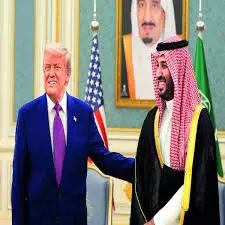Trump’s Diplomatic Gamble: Syria, Sanctions, and Shifting Alliances

In a move that has stunned much of the international community, U.S. President Donald Trump held a historic meeting with Syria’s interim leader, Ahmad al-Sharaa. This marked the first time a U.S. president had met a Syrian head of state since Bill Clinton’s 2000 summit with Hafez al-Assad. The decision was immediately followed by the partial lifting of the Caesar Act sanctions — a strict set of economic measures that had effectively frozen Syria’s economic engagement with much of the world. The announcement has been met with both cautious optimism and severe criticism, reflecting the complex geopolitical terrain the United States is now stepping into.
The Caesar Act, passed in 2019 with bipartisan support, targeted the Assad regime for its brutal suppression of dissent, including documented human rights abuses, use of chemical weapons, and the displacement of millions. Over the past decade, more than 500,000 Syrians have died in the civil war, and nearly 13 million have been displaced — half of the country's pre-war population. The sanctions were seen as a necessary measure to cripple Assad’s grip on power and hold the regime accountable. However, critics long argued that the sanctions also punished ordinary Syrians, impeding humanitarian aid and economic recovery.
With the emergence of Ahmad al-Sharaa as the interim leader — following the apparent exile of Bashar al-Assad in a secret deal brokered by Russia and Turkey — Washington’s calculus appears to have changed. Al-Sharaa, once a Ba’athist loyalist and known for alleged connections to radical Islamist factions, has attempted to rebrand himself as a reformist willing to work with both the West and regional powers. His ascent was facilitated with Gulf backing, particularly from Saudi Arabia and the UAE, who see his regime as a counterweight to Iranian influence in Damascus.
Supporters of Trump’s decision argue that the lifting of sanctions is a pragmatic step in addressing the humanitarian catastrophe in Syria. The country’s economy has been in freefall, with inflation reaching over 140% in 2023 and the Syrian pound collapsing to nearly 15,000 per U.S. dollar. According to the World Bank, over 90% of Syrians live below the poverty line, and over 14 million require humanitarian assistance. Proponents claim that easing sanctions will allow for international investment, resumption of banking operations, and reconstruction of vital infrastructure. More importantly, it opens the door for the return of Syrian refugees — nearly 6.5 million of whom are living in neighboring countries like Turkey, Lebanon, and Jordan.
Within Syria, the response has been jubilant in many quarters. Celebrations were reported in Damascus, Homs, and Aleppo, where citizens waved Syrian flags and chanted slogans calling for peace and reconstruction. For a generation that has grown up knowing only war, the news brought hope of normalcy.
However, the move is not without serious risks. Critics point out that Al-Sharaa’s past cannot be easily overlooked. His alleged role in supporting insurgent groups during the Iraq War and his long-standing ties to radical clerics have raised red flags in intelligence communities. Amnesty International and Human Rights Watch have urged caution, noting that no comprehensive accountability mechanisms have yet been established for the crimes committed during Syria’s civil war. Moreover, some fear that al-Sharaa could consolidate power in ways similar to his predecessor, leading to a rebranded autocracy rather than a genuine democratic transition.
One of the most pressing geopolitical concerns is the impact this move could have on U.S.-Israel relations. Israel, which has consistently viewed Syria as a strategic threat due to its alliance with Iran and Hezbollah, has expressed concern over Washington’s new engagement. Over the past year, Israel has intensified its airstrikes on Syrian military and intelligence facilities believed to host Iranian assets. With the U.S. seemingly warming to Damascus, Tel Aviv fears a weakening of its regional deterrence posture and potential diplomatic isolation.
There is also the issue of precedent. Syria remains on the U.S. State Department’s list of state sponsors of terrorism, alongside countries like North Korea and Iran. Lifting sanctions without removing Syria from this list creates a contradictory diplomatic stance — encouraging investment while warning of legal risks. American companies remain hesitant to engage without clearer legal frameworks, and European allies are watching closely, uncertain whether to follow suit or maintain their more cautious stance.
Trump’s move may also deepen domestic divisions. Congressional leaders from both parties have voiced differing opinions. While some Republicans hail it as a bold step toward ending endless wars and stabilizing the Middle East, many Democrats have warned that the administration is acting unilaterally without congressional consultation. There are also concerns that the decision sends the wrong message about accountability for war crimes and human rights violations.
Ultimately, Trump’s meeting with Ahmad al-Sharaa and the easing of sanctions marks a dramatic shift in U.S. policy. It is a gamble rooted in realpolitik — weighing immediate humanitarian needs and regional realignment against long-term risks of legitimizing a still-uncertain leadership. Whether this approach leads to a peaceful, reconstructed Syria or simply reshuffles the cards of authoritarian control will depend on how the next chapter unfolds. The stakes are immense, and the world will be watching.
